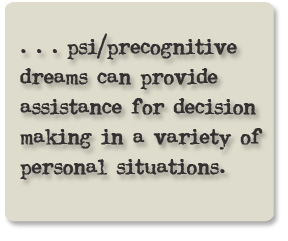|
|
APPLYING PSI DREAMING IN THE PROFESSIONAL ENVIRONMENT, DURING WILDERNESS EXPEDITIONS AND FOR SIGNIFICANT PERSONAL NEEDS DISCOVERING PSI/PRECOGNITIVE DREAMING ©2007 Dale Graff
This heart attack dream and many other verifiable psi/precognitive dreams that followed over the years clearly demonstrated to me the reality of precognition. Due to my engineering and physics background it was difficult for me to initially accept psi, especially precognition. But I could not ignore the data of precognitive dreams and often wondered what precognition implied for our understanding of the universe and what could be done with the phenomenon. Through my work with colleagues I eventually accepted the fact that precognitive dreaming could be experienced by anyone who openly explores dreams. I have also discovered that precognitive dreams can occur for many situations both great and small and can be helpful for the individuals having them. The information they provide can in some circumstances be applied and acted upon3, 4. However, there are instances when they can only inform us, perhaps so that we can be better prepared for the emerging situation. This can still be an advantage, even if we cannot avoid or prevent the perceived event. I have accepted psi/precognitive dreams for the help they can provide, and for the creative energies they can generate. Psi/precognitive dreams have motivated me to write and publish books and articles about them. They have also been of great assistance in my professional activities, during wilderness travel and for personal situations. PROFESSIONAL ENVIRONMENT Here are a few examples of how precognitive dreaming assisted me in my profession. The first one relates to a situation about a co-worker, the second precognitive dream presented information about a high interest technical situation. Something Painful Happens to G. “I am at my desk in my office when I hear an unusual noise from the personnel work area. Cautiously, I open a door and see a thin, tall man lying on the floor, rolling around. He appears to be in great pain.” I woke greatly disturbed by this brief dream. The man on the floor resembled G., someone in my group. It this was G., the dream did not make sense. He was in great physical condition and exercised regularly. However, the dream created an uneasy feeling. As soon as I arrived at the office that morning, I made sure that the telephone number of the nearest emergency medical facility was readily available, just in case. When G. arrived, he seemed to be in good spirits and exhibited no physical discomfort. About an hour later, the dream scenario actually occurred. I heard a noise in the main office area, dashed to the door and quickly opened it. There on floor was G., rolling from side to side, moaning. Immediately, I dialed the emergency unit. They arrived in minutes, evaluated his condition, and quickly transported him to the hospital. His physical situation was a kidney stone attack, not life threatening. In this case the precognitive dream allowed me to avoid unnecessary delays in acquiring emergency help and led me to suspect this approaching situation for G., though painful, was not life threatening. The dream did not present an image of dread or anything life threatening as the previous precognitive dream of my colleague’s heart attack had done. A Soviet Airplane Flies East “I am looking at a map of an extended coastal area that has two large peninsulas projecting to the right (East) side. An airplane approaches from the left side and flies along one of the peninsulas, heading East over the ocean.”
During my professional work on technical intelligence, I have had many dreams that alerted me to emerging situations concerning colleagues and presented information about puzzling technological issues. Some of these technology dreams provided insight for better understanding fragmentary intelligence data. In one instance, a precognitive dream alerted me to an unexpected analysis assignment that actually occurred the next day. This dream also had technologically feasible information that greatly facilitated completion of the report that day. In some operational projects, information in psi/precognitive dreams helped narrow down location possibilities when searching for missing airplanes, hostages and fugitives. I suspect that individuals in any type of work occasionally have psi/precognitive dreams even if they are not clearly recalled and attribute insights from them to good analysis and deductions, or possibly hunches. Those of us who are dreamers should experience helpful psi/precognitive dreams frequently. But can we recognize them and act on them, if practical and ethically feasible, when they occur?
WILDERNESS EXPERIENCES Wilderness exploration, especially through canoeing, is a passion of mine. Over the years, I have traveled thousands of miles on major rivers in Canada and the USA. Some of these journeys extended many weeks and included remote Arctic rivers that flow north above the Arctic Circle into the Arctic Ocean. I have experienced several precognitive dreams while on these remote rivers that provided valuable alerts to existing or emerging situations. Here is one of them that was potentially life saving. Someone in Trouble
I woke, startled, from this brief and fragmentary dream. Without moving in the sleeping bag, I tried to recall more of the dream but could not. The dream invoked the feeling of someone in trouble who needed immediate help. The face resembled C., one of the teenager members of our crew of eight canoeists on the Coppermine River in Canada’s Northwest Territories enroute to the Arctic Ocean. He was in the other tent some distance from mine. It was around 4:00 AM, about an hour before the crew rose to begin the day’s journey. No one should be up at that time, even though it is easy to see in the eerie night time twilight north of the Arctic Circle. We had set up our two tents about a quarter mile from the river on a windy hill to escape the hordes of insects that swarmed around the bushes along the river. My logical mind argued to go back to sleep. It was only a dream caused by fatigue. But something, perhaps the intensity of the dream fragments or a sudden feeling, caused me to jump up from the warm sleeping bag, dress hurriedly and dash down the hill toward the willow and spruce tree grove where we had secured our canoes and equipment below a powerful waterfall. I felt strongly that someone was there and needed help. But my logical mind argued otherwise. This irrational act was a waste of time and was foolish. When I emerged from the bushes at the river’s steep bank, I was shocked to see C. partially submerged in the frigid water, desperately clinging to a thin willow root, trying to climb out of the river current! Quickly, I pulled him to the top of the bank, gave him my dry clothes, started a fire and heated water for hot cocoa. On a whim, he had decided to arise very early to fish for Arctic char. At the edge of the high river bank he slipped and fell into the deep fast moving water. He struggled back to shore and gripped a willow root. He may have been able to lift himself to the top of the bank without help although he was quickly succumbing to hypothermia. This brief dream was either a real time psi dream of an event that had just occurred or a precognitive dream of a potentially serious situation about to happen. The dream imagery, especially the feeling of a need for immediate action, motivated me to race to the river as quickly as possible, no matter how uncomfortable or foolish it was. Traveling together in difficult wilderness environment on a challenging river helped generate a bond that for me, facilitated psi experiences. Our concern for the safety and well-being of one another was also significant in establishing rapport. I was the only psi dreamer in the group. However, my companions very likely exhibited their sensitivities through intuitions and “good judgments.” I have had several other psi/precognitive dreams in the wilderness and believe that they can be experienced by anyone in similar situations, and that they can provide valuable information anywhere, particularly in life threatening situations. Unfortunately, such alerts are often ignored out of reluctance to be wrong and appear foolish or the situation we are in requires too much of a shift in routine and may present risks that we are unwilling to take.
PERSONAL NEEDS
I have experienced many psi dreams that have provided useful information for personal needs, such as house hunting, automobile difficulty alerts, unexpected visitors, and a variety of other situations7. Here is a precognitive dream that helped in a property sale decision. It correlated with an agonizing decision among my two sisters and myself related to the sale of our mother’s house a few years after she died. The three of us wanted to hold unto the house but knew that was impractical and put it on the market. After six months we were about to drop the price or take it off the market when this dream occurred. Mother Leads the Way/Young Bare-Chested Man and N. “I am walking in an old section of town near a deserted large old building. Mother is in the street in front of me and is looking toward a row house next to the old building. She turns toward me and beckons me to follow her. She moves fast and I have to run to stay with her. Soon we are in the section of town where her house is located. She pauses at her house and goes somewhere. I enter the house. Inside, I hear someone ring the doorbell, and open the door. A young man without a shirt enters. He dashes around the living room and runs up the stairs to the bedrooms. He acts as if he owns the place! Then a young woman comes into the house and goes upstairs.” As I reviewed this dream, I felt that it had a clear message: Keep the house on the market since it would soon be sold. Someone was “about to own the place.” The young woman in the dream resembled N., someone I knew years earlier during high school and had not seen since. I had no association to the shirtless young man. I was also puzzled as to what the presence in the dream of my deceased mother implied. As a result of this dream, I persuaded my sisters to leave the house on the market. I did not tell them about the dream. About one week later a real estate agent brought a young man and woman to the house, but I did not recognize them or their last name. The young man was wearing a thin fishnet style shirt that gave him the appearance of being shirtless. As they walked around the house, the doorbell rang. I opened the door to see N! She was the young woman’s mother and was there to help the young couple decide if they should purchase the house. I could hardly believe what was happening but nevertheless I felt certain that they would be the new owners. Later that day we had a house sale contract for the listed price. The young couple’s address was an apartment next to an old former textile building. I have often wondered about this dream; its timing, the complex interactions, the exact specifics and especially the role Mother may have had in its creation. Maybe her presence in the dream was only from my memory, or maybe it was a combination of memory and contact. I could not be sure. However, I was quite sure that the dream, however created, was a valid precognitive dream and that it provided help for a house sale decision.
ISSUES FOR THREAD DISCUSSION Some books that discuss precognition and precognitive dreaming emphasize that they are unreliable and should not be used for any decisions8, 9, and 10. This viewpoint is usually provided by psi researchers based on non-realistic laboratory situations, by some practicing psychologists, psychiatrists, therapists and others. Sometimes incredulous claims by media seeking “psychics” contribute to this view. However, it has been my experience along with others that psi/precognitive dreaming can be reliable and can provide useful information as long as critical perspectives and careful evaluations of the data are made within an ethical and common sense decision making framework11, 12, 13, 14. Some suspected precognitive dreams do not manifest or are misinterpreted. Then we may look foolish depending on how we presented or responded to the information. But is it not better to occasionally be wrong and look foolish than to not act and remain in harm's way? I believe that dreamers and especially those who maintain a daily dream journal can experience reliable psi/precognitive dreams. I have found that certain dream incubation constraints can be very helpful for experiencing reliable precognitive dreams. These include:
You may have discovered other methods for how to experience psi/precognitive dreams and enhance their quality, and can discuss them in this thread. So I ask:
I believe that psi/precognitive dreaming is an extremely valuable resource that is available to all dreamers. All we have to do is to accept its potential and find ways appropriate to us for receiving the help that psi/precognition dreaming can provide. So . . . join us for intriguing discussions. Dream On . . . precognitively!
REFERENCES
Dale E. Graff Close window to return to the bulletin board
|
| IASD Home Page | PsiberDreaming Home |

 In 1970, I began recording dreams in a Dream Journal to systematically evaluate their content and see in what way they could be useful. Based on some of the readily available books about dreams that presented views by Freud and other psychologists and psychiatrists, I expected dreams to present current concerns or repressed desires, perhaps somewhat incoherently1,2. My first recorded dream was about an existing situation, but the second dream was a surprise. It presented the unexpected heart attack of an acquaintance that occurred five days after the dream. I was certain that there was no way that I or anyone could have anticipated this approaching incident. He appeared to be in excellent health.
In 1970, I began recording dreams in a Dream Journal to systematically evaluate their content and see in what way they could be useful. Based on some of the readily available books about dreams that presented views by Freud and other psychologists and psychiatrists, I expected dreams to present current concerns or repressed desires, perhaps somewhat incoherently1,2. My first recorded dream was about an existing situation, but the second dream was a surprise. It presented the unexpected heart attack of an acquaintance that occurred five days after the dream. I was certain that there was no way that I or anyone could have anticipated this approaching incident. He appeared to be in excellent health. 
 “I see a hand, as if suspended in air, reaching up toward something. A partial face appears. The hand seems to slip into something dark.”
“I see a hand, as if suspended in air, reaching up toward something. A partial face appears. The hand seems to slip into something dark.”  I believe that psi/precognitive dreams can provide assistance for decision making in a variety of personal situations. When we have done all that we can, then we still have the option of reaching out, or in, to seek the help that can potentially be available from our psi senses. Psi/precognitive dreams can help us in relationship issues, business situations or in any aspect of our daily life5, 6. They can assist in locating something lost, help us discover something or someone for a specific need or pave the way for a synchronicity, an aspect of precognition. Sometimes the “need” is not intended consciously to have a precognitive dream, but the dream occurs anyway. A persistent need acts like a dream incubation desire.
I believe that psi/precognitive dreams can provide assistance for decision making in a variety of personal situations. When we have done all that we can, then we still have the option of reaching out, or in, to seek the help that can potentially be available from our psi senses. Psi/precognitive dreams can help us in relationship issues, business situations or in any aspect of our daily life5, 6. They can assist in locating something lost, help us discover something or someone for a specific need or pave the way for a synchronicity, an aspect of precognition. Sometimes the “need” is not intended consciously to have a precognitive dream, but the dream occurs anyway. A persistent need acts like a dream incubation desire.